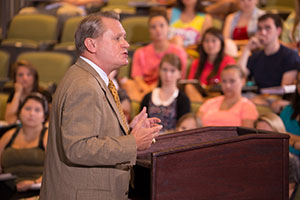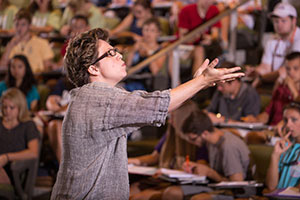
On the second day of classes Chancellor G. David Gearhart welcomed 110 Honors College students to the Honors Humanities Project, popularly known as H2P. Now in its 19th year, this four-semester sequence of courses taught by teams of top professors, deans and department chairs has produced a host of award-winning alumni, including Rhodes, Marshall, Goldwater, Truman and Fulbright scholars.
“You’re probably wondering, ‘Why in the world did the chancellor get out in this heat to come talk to you?’” Gearhart said to the room filled with expectant honors freshmen, who are pursuing majors that range from poultry science to theatre, marketing to biological engineering, in colleges across campus. “I’m here today to impress upon you that this is a big deal class, a cornerstone experience for many honors students. It’s an honor bestowed on our best and most promising students. I hope you take advantage of this opportunity, and get as much from teachers as they have to give.”
Gearhart then introduced the H2P first semester teaching team, which includes Jennifer Hoyer, an associate professor of world languages whose research focuses on poetry in Germanic languages and Jewish studies; Daniel Levine, a professor of world languages and classics program head who has published numerous essays on classical Greek literature; and Jared Phillips, a new history instructor who has spent the last five years working on modernization, indigenous rights, heath care and environmental issues in Tibetan areas of China and rural Guatemala.
The chancellor said, “We are here with you every step of the way.”
 Jennifer Hoyer leads a lively discussion on Australian Aboriginal culture. Jennifer Hoyer leads a lively discussion on Australian Aboriginal culture. |
For the honors students, a recording of the Aboriginal “Emu Dance” provided an electric, visceral launch to the morning’s critical discussion of Bruce Chatwin’s The Songlines, a semi-fictional account of the author’s encounters with indigenous Australians and their culture and cosmogony.
The course chronology ranges from the shrines of early Christian martyrs and Mayan ball courts to the shag splendor of Elvis’ Graceland mansion and the impossible proportions of the Barbie doll. The goal of the course is to build bridges across disciplines and colleges and to move beyond the simplistic duality that often shapes humanities courses – Western/non-Western, ancient/modern, sacred/profane and civilization/barbarism, for example.
“We go for wide exposure in this class and attempt to integrate history with architecture, art and literature,” Levine said.
“And it is this breadth of exposure during our students’ first two years that allows them more confidently to identify the interest that will lead them to their major, and to their lifelong passions as well,” added Sidney Burris, director of the honors program in the J. William Fulbright College of Arts and Sciences.
Class lectures are augmented by weekly discussion sections where students are encouraged to express their point of view.
“The students get comfortable with discussion in these seminars – they’re good preparation for job and scholarship interviews,” said Lynda Coon, an associate dean of Fulbright College who has been involved with the course since it began in 1995.
H2P alumnus and Sturgis Fellow Jay Carney is now a professor of theology at Creighton University whose first book, Rwanda Before the Genocide: Catholic Politics and Ethnic Discourse in the Late Colonial Era, was recently published by Oxford University Press. In a recent email he confirmed the challenges and value offered by the course:
“H2P was tough … But this ‘humanities boot camp’ … showed me that the humanities really matter. Modern American higher education can be pragmatic to a fault; everything is about job preparation, professional skill development, career networking, etc. And given the costs of higher ed, much of this is understandable. But at its roots, a liberal arts education is about much more than ‘getting a job’ or ‘getting into a good grad school.’ It's about thinking about what matters, seeking truth and meaning in a complex world. When I was first beginning my dissertation on Catholic history in pre-genocide Rwanda, I was told by multiple contacts that ‘thousands of people have died here over how we tell our history.’ Rwanda showed me that history is a life and death matter. But the journey that led to this conclusion really began back in H2P."
Carney, an exceptional H2P student and scholar, is by no means a rarity. He provides one of many examples of Chancellor Gearhart’s assertion that H2P leaves students “well positioned for the future.”
Contacts
Kendall Curlee, director of communications
Honors College
479-575-2024,